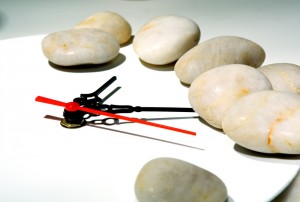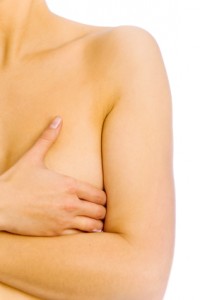Wednesday Bubble: More flack about flaxseed
First Bubble of the year!
Ya know, the news on flaxseed continues to be less than stellar, at least in so far as its effect (or lack thereof) on hot flashes. And while the flaxseed story continues to build on benefits in terms of bone health and even breast cancer reduction (see these links), you may want to seek alternatives when those flashes start taking over.
In fact, results of a well-designed, scientific, controlled study in which women ingested a daily flaxseed bar or a placebo bar failed to show much benefit at all. The study, published in this month’s Menopause journal, analyzed the effects of flaxseed (containing 400 mg of the estrogen like antioxidant, lignan, 6 gm of protein and 20% fiber) in 188 women in menopause who reported having anywhere from 4 to more than 10 hot flashes a day over a period of 9 months or more. Participants ate flaxseed or a placebo bar (containing 2 gram of protein and 20% fiber) for six weeks. The bars were eaten all at once or throughout the day and the women were asked to record the frequency and severity of their hot flashes in a personal diary.
The results? Regardless of whether or not the women ate flaxseed or placebo, their hot flashes were reduced fairly equally, with about about a third of the women in each group reduced their hot flash scores by 50% or more. Another third of women in each group noted that they didn’t experience any effect at all. Moreover, both types of bars caused gastrointestinal problems, namely bloating, gas and diarrhea, most like due to their considerable fiber content.
Meanwhile, if you like flaxseed, there is absolutely nothing wrong in eating it. It may help your bones, fight cholesterol and keep you regular. But in so far as the flashes go, you definitely want to look elsewhere.
[Evidently, this study first appeared online in September. Thanks to Ivan Oransky over at Reuters Health for the heads up. And if you want to read more, here’s their piece on the same study.
Read MoreNewsflash: black cohosh – one of these is not like the other
Love the first line of this editorial:
“Black cohosh preparations are not all the same.”
That is,
“Vigilance must be exercised when interpreting data.”
In other words, sometimes it appears that black cohosh is a significant and real alternative to hormones for battling hot flashes and even some other menopausal symptoms. And other times, it appears that it’s not. The reason? Product variability and dosage.
A bit of geek: you may recall that black cohosh is an herb from the buttercup family. Its scientific name is Cimicifuga racemosa. But, there are many different types (or species) of Cimicifuga and researchers say that when the continents split, these plants took different directions and ended up with distinct chemical compositions. Moreover, when they analyzed the products for certain active components, they found significant variability.
Add this to the fact that researchers studying black cohosh have used dosages ranging from 2.8 mg to 160 mg, and that these formulations were pure or were what they call “multibotanicals” (i.e. containing other herbs believed to be effective to qualm flashes and mood swings) and well, you have a veritable melting pot of clinical crap that defies logic. Add in a dash of more scientific geekdom know as a bell shaped response, in which low doses of a drug may be ineffective, moderate doses are effective and at higher doses, benefits disappear again, and well, it’s almost impossible to draw any firm conclusions.
Wow. Pretty scary, right?
The Menopause Industrial Complex will have you believe that the only effective preparations for ‘treating’ the disease they call menopause are pharmacological preparations manufactured by a large company and that has undergone rigorous, controlled scientific analysis. A lot of Western practitioners will have you believe that not only have herbs not be rigorously tested and studied under the same scientific conditions, but that they are downright ineffective and sometimes downright dangerous.
Guess what?
Both camps are incorrect. Because when you peruse the archives of the National Library of Medicine or esteemed journals like Maturitas or Menopause, you will find scientifically controlled evaluations of herbs. And, when researchers take the time to tease out data rather than drawing automatic conclusions (as the authors did in the piece I am referring to, which was published online in Maturitas at the end of December), they find that perhaps, the herbs are more effective than believed and that there are reasons for disparate results.
So, black cohosh, yay or nay?
Let’s get back to the original thought:
Black cohosh preparations are not all the same.
For me, a standardized extract that has undergone rigorous clinical study – Remifemin – works wonders. And I hear that it does for a lot of women. But not all women are the same either.
Two words.
Be vigilant.
Five more:
Don’t believe everything you read.
Happy New Year. Let’s approach this year as the year for opening our eyes and taking back our aging process.
Menopause? It’s not a disease and symptoms can be effectively and safely ameliorated with certain herbs. Just. Be. Vigilant.
Read More
Wednesday Bubble: is DHEA the path towards a better sex life?
Today’s Bubble is a doozie that can one of two ways: in the yes(!) column or in the no (!) column. I’ll leave it to you to decide.
DHEA is the most abundant sex hormone in circulation and is mostly secreted by the adrenal glands. Research has shown that low DHEA levels in pre- and postmenopausal women may negatively affect sexual functioning, while ample blood levels may enhance sexual functioning, cognitive functioning and wellbeing. Yet, whether or not DHEA really works continues to be controversial. And the reason behind the burgeoning interest is the quest to find a suitable replacement for HRT. The thing is? There are lots of suitable, evidence-based replacements that are not broadly accepted by many medical professionals and many of these are discussed regularly on this blog. Nevertheless, here’s what researchers have just discovered about DHEA.
The researchers, from Pisa, Italy, followed 48 healthy, postmenopausal women for a year. During this time, they divided 36 women who were experiencing troublesome menopausal symptoms and requesting hormone replacement into three groups:
- 12 women who received 10 mg daily of DHEA
- 12 women who were given combined HRT
- 12 women who received the synthetic hormone, tibolone, daily
The fourth group was comprised of 12 women who did not wish to use HRT. They received daily vitamin D (400 IU) and calcium to help combat osteoporosis.
At the start of the study, all of the women reported similar sexual activity. However, after a year of treatment, women taking DHEA had significant increases in sexual interest and activity scoring almost 14 points higher on a questionnaire used to measure sexual interest, satisfaction, vaginal lubrication, orgasm and sexual partner. The women taking HRT experienced similar benefits, and women in both of these groups reported engaging in more sexual intercourse compared to women taking Vitamin D and calcium. Women taking the synthetic hormone also had increased sexual interest scores but they were not as high as the other two hormone groups. The magnitude of improvements in menopausal symptoms was also similar between the DHEA, HRT and tibolone groups.
The reason for this improvement appears to be the effect that DHEA has in terms of improving blood levels of the hormones estradiol and progesterone, both of which decline during menopause. It also appears to positively affect adrenal functioning.
What to think? Well, the study didn’t include any information on side effects. This is what Mayo Clinic has to say in that regard:
“No studies on the long-term effects of DHEA have been conducted. DHEA can cause higher than normal levels of androgens and estrogens in the body, and theoretically may increase the risk of prostate, breast, ovarian, and other hormone-sensitive cancers. Therefore, it is not recommended for regular use without supervision by a licensed health professional.”
Another important fact, acknowledged by the researchers, is that DHEA was only studied in 12 women, hardly enough to draw any firm conclusions. But they do believe that the findings, albeit preliminary, are encouraging, especially for women who “may have problems in taking more conventional HRT.”
Personally, I believe that it’s waaaaay too early to even consider DHEA as an alternative to HRT and in particular, to androgen therapy for sexual health. I want to see more information on side effects before it’s even on the radar. Meanwhile, I would love to hear what you think:
Yes!?
or,
No!?
Read MoreJust 60 minutes a day…
keeps the symptoms at bay?
You know that I’m all about exercise, not only to maintain fluctuating weight but also to chase those moody blues away . But did you know that increasing your workout to at least 60 minute a day may actually improve wellbeing and lessen menopausal symptoms?
I stumbled across this piece last week and just knew that I had to share. And I am especially interested because it appears that too much exercise can set off early menopause (I’m still looking into this story). But to the study at hand.
Researchers, intrigued by the relationship between physical activity and menopausal symptoms, randomly assigned menopausal women to one of three groups:
- Less than 30 min/day physical activity
- Maintained or increased physical activity from 30 to 6o min/day
- Maintained or increased their physical activity to more than 60 min/day
During the time that participants were studied, their regular, habitual activity was defined as whenever they did something active for at least 10 minutes, e.g., household chores, transportation, etc. Additionally, all were encouraged to be more active (e.g. taking stairs versus an elevator) or at the very least, maintain their current activity levels during the time that they were enrolled in the 12 week study period.
Granted, while the outcomes were modest, the research did show that women who engaged in moderate to rigorous activity for at least an hour a day benefitted both in terms of feeling more positive about themselves and begin able to focus as well as in their personal relationships compared to peers who did 30 minutes or less a day. Overall, almost all menopausal symptoms were also lessened with the highest degree of physical activity. And, the researchers likened the improvements in mental wellbeing to the ability to, at the very least, maintain weight.
An hour of moderate physical activity daily? That’s a lot when your life is filled to the brim and your hours, maxed out. But, at the same time, mid age changes in body composition, hormonal fluctuations and increased risk of heart disease all point to one conclusion: it may be worth it to make the time. If you can’t get to the gym, at least take the stairs.
Treat yourself. You’re worth the hour.
Read MoreWednesday Bubble: More on breast tenderness, hormone replacement and breast cancer
More bad news on the hormone replacement front: if you are taking estrogen (conjugated equine estrogen) with progestin (medoxyprogesterone) for menopausal symptoms and experience breast tenderness, you may want to think twice.
Frankly, this news isn’t exactly new. Because back in 2009, UCLA researchers reported similar findings in the Archives of Internal Medicine. These newer data, provided by the same researchers at UCLA’s Jonsson Comprehensive Cancer Center and published online in Breast Cancer Research and Treatment only add to the hormone risk fodder.
The researchers say that in their research, they’ve consistently run across data that suggest that “estrogen plus progestin compared to estrogen alone, have a more marked effect on breast tissue,” possibly due to more growth, leading to greater density. According to the lead study author, Dr. Carolyn Crandall “higher breast density (has been shown to be) associated with a higher risk of breast cancer,” adding that “in women with extremely dense breasts, the cancer risk can be four to six times higher than for women whose breasts are not dense.”
In this update, Dr. Crandall and her colleagues reviewed data from the Women’s Health Initiative, specifically focusing on reports of new breast tenderness. At the study’s start, almost 12% of women taking estrogen alone or estrogen in combination with progestin reported having breast tenderness. However, by the first year, women in the combination hormone therapy group reporting onset of breast tenderness after starting hormones had a 33% greater risk of developing invasive breast cancer compared with their peers who did not have breast tenderness. And while estrogen alone also increased the risk for developing breast tenderness, the effect was less than that of the combined hormones, especially since it did not lead to an increased breast cancer risk.
So, what to make of these new data? If you are taking HRT and develop breast tenderness, you need to speak to your health practitioner, assess your risks and make a joint decision as to whether or not the benefit of fewer menopausal symptoms is worth the risk of possibly developing an invasive form of breast cancer. And if you are not yet using hormone therapy, you may just want to step back and think twice.
Buyer beware: hormone therapy is a slippery slope with bumps, bruises and perhaps serious disease. Is it worth it? Only you can decide.
Read More










